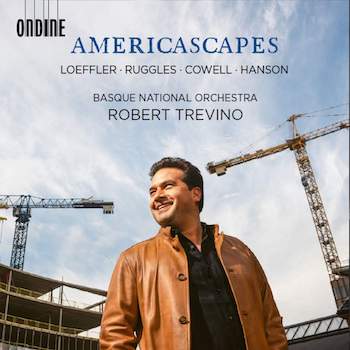Classical Album Review: A Completely Refreshing “Americascapes”
By Jonathan Blumhofer
A terrific album, commandingly played, that adds to our knowledge and appreciation of this too-long-neglected repertoire.
 Hats off to Robert Trevino and the Basque National Orchestra (BNO): they’ve given us one of the finest recordings of American orchestral music of recent years. Their new Ondine disc, Americascapes, goes in a completely refreshing direction, highlighting the music of four composers who, if they’re known at all, are spoken of more than heard: Charles Martin Loeffler, Carl Ruggles, Howard Hanson, and Henry Cowell.
Hats off to Robert Trevino and the Basque National Orchestra (BNO): they’ve given us one of the finest recordings of American orchestral music of recent years. Their new Ondine disc, Americascapes, goes in a completely refreshing direction, highlighting the music of four composers who, if they’re known at all, are spoken of more than heard: Charles Martin Loeffler, Carl Ruggles, Howard Hanson, and Henry Cowell.
What’s more, this quartet is represented by a set of pieces that are rather off even their own (rarely) beaten paths.
Loeffler, the oldest of the group, was an accomplished violinist as well as composer: he served as the Boston Symphony’s assistant concertmaster from 1882 to 1903. A friend of seemingly every artistic figure under the sun, he counted Eugène Ysaÿe, John Singer Sargent, and George Gershwin among his many companions.
The 1905 tone poem La mort de Tintagiles reflects Loeffler’s wide-ranging musical interests. The melodic writing soars. Tintagiles’s orchestration is iridescent: there’s lovely writing for harp, some robust scoring for horns and strings, delicate woodwind embellishments, and — best of all — expansive solos for viola d’amore.
Even if the larger piece recalls his contemporary George Whitefield Chadwick at his more verbose, Loeffler knew how to handle the orchestra well and there are some alluringly lush, blurry dissonances that crop up here and there to hint at the sensuous worlds of Debussy, Scriabin, and Strauss.
Trevino’s reading is well balanced and directed throughout, the BNO’s playing rhythmically articulate and secure. Delphine Dupuy’s viola d’amore solos are pristine. Given the excellence of the performance and its recorded sound, as well as the scarcity of Tintagiles recordings (the last one dates from 1992), this is now the go-to version.
Likewise compelling is the BNO’s take on Cowell’s riotous Variations for Orchestra. Written in 1956, the piece is nothing if not completely unpredictable. Rhythmic games are afoot from the start (where a two-against-three pattern threatens to throw the proceedings completely out of whack just as they get underway).
But the rhythmic happenings are nothing compared to the instrumental ones that need to be heard to be believed. Let’s just say that Cowell’s ear for color and timbre were both bracing (like in the variation for strings, percussion, and piano) and affecting (as in the magical pastorale for English horn, clarinet, piccolo, violin, and viola).
Trevino and his orchestra revel in the Variations’ quirks, crisply passing its motives about, boldly painting its contrasts of mood and character, and seeming to have a blast all along the way — as their playing in the skittish, woozy fugue that closes the piece attests. One mightn’t always describe a sometimes-thorny, mid-20th-century score by one of the US’s great maverick composers as a joyride, but that’s exactly what this piece and performance are.
Filling out the album are Hanson’s passionate Before the Dawn and Ruggles’s mighty Evocations.
The Hanson is appealing and mellifluous, if a bit less visceral and immediate than either the Cowell or Ruggles selections. Regardless, in this, its debut recording, the BNO woodwinds shine in their exposed episodes around Before the Dawn’s midpoint.
Evocations, on the other hand, stands as something of an American equivalent to Schoenberg’s Five Pieces. Originally written for piano but adapted for orchestra in 1943, its four movements are uncompromisingly dissonant yet also concise and brilliantly colored.
Much of the latter quality comes across in Trevino’s reading, which is admirably sumptuous. Perhaps too much so: there’s a bit less of an edge to the sound than one might expect from, say, Michael Tilson Thomas’s take on Ruggles.
The tradeoff, though, is a beguiling lyricism in the Evocations that one otherwise might not know was there. This is particularly true of the last two movements, which are invigoratingly shaped and well directed.
In all, then, a terrific album, commandingly played, that adds to our knowledge and appreciation of this too-long-neglected repertoire. Bravo.
Jonathan Blumhofer is a composer and violist who has been active in the greater Boston area since 2004. His music has received numerous awards and been performed by various ensembles, including the American Composers Orchestra, Kiev Philharmonic, Camerata Chicago, Xanthos Ensemble, and Juventas New Music Group. Since receiving his doctorate from Boston University in 2010, Jon has taught at Clark University, Worcester Polytechnic Institute, and online for the University of Phoenix, in addition to writing music criticism for the Worcester Telegram & Gazette.
Tagged: Americascapes, Basque National Orchestra, Jonathan Blumhofer, Ondine
